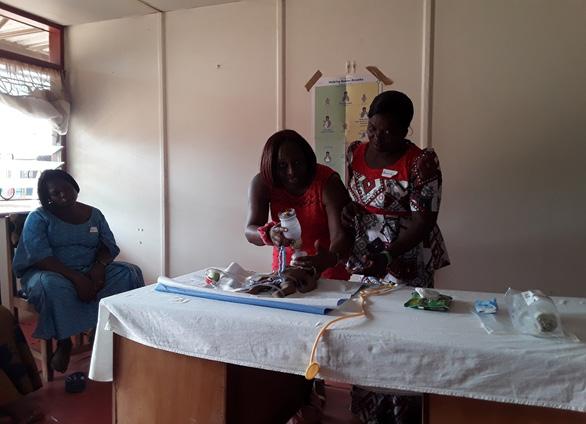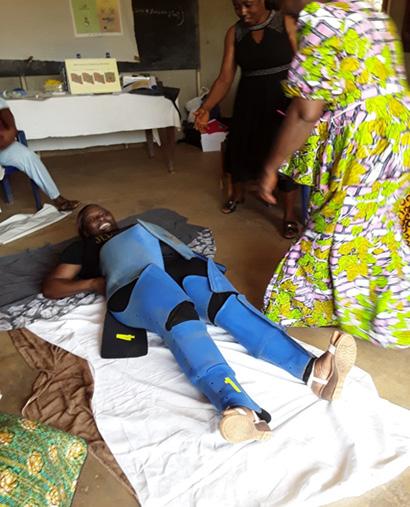
17 minute read
Staying Safe & Healthy
STAYING SAFE & HEALTHY FROM COVID-19 VIRUS
Coughs and spluttering everywhere Contagious droplets we don’t want to share Young and old and in the between This virus is rampant and very keen Beware, beware of Covid- 19
Advertisement
It takes a virus to spread everywhere Before we show the elderly we care The evidence is clear on the supermarket shelves That humanity in crisis only thinks of themselves
Hygiene is a personal responsibility Our hands are ours, it should be down to me! Washing our hands is not something new Our researchers and scientists have better things to do
The world is shocked by Covid -19 A pandemic this generation has never seen Every colour, race, rich or poor The virus can enter your own front door Money and investments cannot buy you health Covid -19 can’t be blackmailed with wealth Covid-19 is a global emergency Caring for yourself and others is the key The pandemic has caused us to surely think About the basics of life and our humanitarian link Let’s not be selfish in our quest to survive Common sense and kindness will keep us alive.
Tribute to the NHS Staff
Staff and volunteers of the NHS Your all hero’s and nothing but the very best You give your all both night and day Your work ethic and compassion Are not reflected in your pay Thank you for the sacrifice you tirelessly make No sleep, no food, no time for tea breaks Thank you NHS staff and volunteers Your dedication and skills Caused Great Britain to shed grateful tears
Written by Annice Thomas COVID-19 March 2020
COVID-19 WOMEN AND LEADERSHIP MEETING SUMMARY By Kuviza Mutisi
“Behind every successful woman, there is a tribe of women” - The UK diaspora comes together to talk Women and leadership. (Cecily)
4. Sanui Koroma She is an advocate against female genital mutilation. She spoke of the importance of personal growth to ward off insecurity.
The UK Africa Diaspora assembled this past week to discuss the evolving role of women in society. A panel of speakers to the lead the discussion covering an array of topics surrounding women and leadership in the 21 st century. The two and a half hour meeting inspired women from UK and Africa to take control, realise their potential and not to conform to the stereotypes of women in society. Here is a summary of each speaker and their message.
1. Winnie Makai The communication consultant who was speaking from Kenya spoke about the need for policy and policy reform in times of crisis. A lot of the information they’ve been hearing is about purchasing and cost of COVID 19 relief. She believes as a leader you must be able to anticipate and adapt in times of crisis. “Coronavirus is in Europe but COVID 19 is in Africa, what is the difference? Coronavirus is a deadly disease but COVID 19 is a business concept” “The continent has taken this opportunity to do business”
2. Dr Callun Johnson Dr Johnson who supports victims and survivors of domestic abuse spoke of her work in trying to prevent suicides due to lockdown restrictions. She urged to people to reach out for support if they’re suffering from abuse or need help with childcare. “Its been the most horrendous time for people living with the perpetrator” “You have places to go, you do have people to see, do not suffer alone.”
3. Iris Aekah The life coach shares her story and inspired members of the meeting to control their lives by gaining more knowledge. She urged people to focus their minds on positive and not to conform to what society wants for women. “If you become a master of your mind, you master your life”
5. Esther Onana A legislator by profession she encouraged a shift in policy to prevent poverty. She also encouraged women of today to inspire each other and share ideas. The speaker then spoke of the importance of helping women with disabilities. “It is the mindset that works, even in overcoming ailment.” “Policies that are preventing poverty irradiation need to be put in place”
6. Abigail Kabirou The physiology and psychology student and youngest speaker Abigai,l spoke of the expectations of young women in the 20 th century. She spoke of the identity conflict many young people have living in the diaspora. Abigail also encouraged young women to have high aspirations and motivated the meeting speaking about the importance of achieving the best you can as an individual. She spoke of the societal pressures faced by women and the threats posed by an educated independent woman. “This is the age of a multifaceted woman” “How can you enrich yourself to become the happiest version of you”
7. Baker Kiyingi Mr Kiyingi, a community leader within the Ugandan Muslim community gave his take on women leadership stating women have always been powerful. He believes if women pulled their resources they serve the community better than men but this need to happen more often. He urged women to appreciate the power they have and to work with men to help improve society. “Women shape the generation, women have so much strength and so much power and so much to give to the community and society.”
8. Veronica Kararwa Veronica gave advice to the attendees about how to navigate ourselves in times of need. Veronica urged women to realise the power they have and to take
the lead. She expressed the need for women to stop fighting against each other but to work together, calling on businesswomen to try help more women in getting through the door. “You cannot lead when you’re facing the crowd” “We as women are our worst enemy because we are too critical and judgemental on ourselves”
9. Susan Fujana-Thomas The councillor called for greater intervention from the government to implement government policies focused on the advancement of women in society. Mrs Thomas spoke of the importance of accessing capital, but the discrimination faced in the business sector hinders progression. The councillor also stated was discrimination in business and cultural stereotypes of women needed to be talked to help empower women. “We need to tackle discrimination in women entrepreneurship” “It is important for government to put policies that encourages women and that are gender responsive to help women succeed in the business arena”
10. Julliet Makhapila Mrs Makhapila’s message to UK diaspora was we need to change patterns around the world. She questioned the role of women in the diaspora. She also questioned the metal and physical health of women and the role women play in decision making. The message conveyed was also the importance of having women in places making real decisions. “What do women want to achieve in the diaspora?”
11. Rosemary Kamau The teacher and psychologist speaking from Nairobi Kenya, Rosemary spoke the importance of science in the world urged the next generation of women to get involved in science. Mrs Kamau wants to change how women are portrayed in education and urge the next generation to take up the harder subjects. “The days have gone where the only place women are needed is domestically” “We need to change the way women are viewed in society”
12. David Karikuki The team leader transforming community initiative advocates for community development through men and women actively working together. The importance of a good leader will help the progress and partnership between me and women. Mr Karikuki also emphasised the importance of breaking down discrimination, recognising human rights within the community. “The collectively and partnership between men and women in the 21 st century is key”
13. Dr Mel Wealth Magent Shared her personal journey being a businesswoman and mindset change to generate wealth. She spoke of the importance of having wealth in the business sector. Urged members to change the way change you think. “We must have wealth in order or us to have influence” “we must be teaching our African woman that anything can be possible”

14. Tarela Aghanti Spoke about the importance of finding happiness and joy in chaos. She spoke of the importance of including women with disability in the women empowerment debate. She emphasised women with disability need to be placed in places of influence to impact society. “I strongly believe that women with disabilities have something great to give to society.”

GREEN AND GRAND -2020 By Florence Makinde A big congratulations and a wellThe figures for 2019 were: done salute to all my comrades, professional and educational practitioners within the NHS. The outstanding work of Carers, Nurses, Doctors, Midwives and Nursing Associates and Allied Health Care Professionals in the WHY DO BLACK WOMEN DIE DURING CHILDBIRTH? UK is commendable for the lifesaving role they have performed to date during the Covid-19 pandemic. Just as it is good to know that a formal review is to be launched into why people from a black and minority ethnic background appear to be disproportionately Green and Grand has been portraed here as a ray of hope for the BAME and particularly Africa, where the Maternal mortality rate remains provokingly high and in need of urgent attention. The colour Green meaning Life and the term Grand suggesting hope of support for Helping Mothers and Babies Survive. We deeply honour and respect those families who have lost loved ones, especially those who have lost their lives affected by COVID-19 (Sky News 16/03/2020). Where black African deaths are three times higher than their white Britons-( BBC News May 2020) ----Likewise, it would be great to know why black women are at a greater risk of dying, five times more likely than their counterpart white women during childbirth. This was reported by BBC Radio during “Woman’s hour (BBC Radio -15/07/2019) and the (Embrace report) working as health care professionals within the NHS in the UK and every health care service abroad. We will always remember them in our prayers.
I have found out that there are even starker statistics where the lifetime risk for a woman dying in pregnancy or childbirth is also found in UNICEF Publications (see reference below). With the highest Maternal Mortality rates in the world: in African countries such as Sierra Leonne and Nigeria and of course other African and Asian countries. In the United Kingdom-Risk factors vary from black women to black women as individuals coming from different countries, backgrounds and places These include challenging health conditions-lack of early attendance to the maternity services (e.g. refugee status) mental health problems, high blood pressure. Diabetes, lack of preparation for childbirth, and the inability to ask the appropriate questions to get help or adequate pain relief. The maternal mortality statistics in Nigeria are shocking and the causes are well-understood, and this Nigeria Health Care project has enabled me to do something practical to help by training people in the detection and management of PPH in what appears to be an effective way. Lack of understanding of their own bodies and pain thresh hold, poor attendance to antenatal classes (mainly abroad). FGM and other childhood problems, Fear and traditional beliefs. Religion and concerns of childbirth. Maternal sepsis and Blood disorders such as lack of Vitamin Even though the maternal mortality statistics in the UK are K deficiency or Vitamin D and previous or high risk of massively better (life-time risk of death 1 in 8,400 in UK; 1 in 21 in Nigeria) but the causes of excess mortality in black women in the UK (which are also shocking) are not wellunderstood. Post-Partum Haemorrhage (PPH). Economic factors and financial status. Maternal Stress and lack of support during childbirth from a service provider in their home country. Young black women and second or third generations born in the UK may never have known some of these genetic
This publication report into the excess deaths of women in the BAME backgrounds has triggered an interview with the BBC Radio Berkshire, where I was called to present what Sadly, just as the Corona virus (Covid -19), has taken away so my thoughts, my passion and interests were around this many black and BAME lives in the recent Pandemic within the UK (BBC News 2020), black women have continuously suffered the loss of their lives for many decades. The statistics from the death of women dying in childbirth in Africa alone are significantly higher than anywhere else topic. They also wanted to know and what work I had been doing to support women during childbirth. I subsequently attended the BBC Radio Berkshire in Feb 2020; this has prompted my caring and compassion with courage to create an awareness or impact on Helping Mothers Survive in the world fact book Central Intelligence Agency 2015- (World Statistics www.cia.gov).
REASONS-VARY FROM COUNTRY TO COUNTRY
or health problems existed untill they attend the maternity appointments, they will need time to explore and find out more from their grand-parents or own mothers (if they are still alive).
MY AMBITION -INTRODUCTION
Having studied Midwifery in the United Kingdom and subsequently worked as midwife for 20 years for the NHS, I developed a personal interest in teaching obstetric emergencies -internationally. My interests are now based on researching “why black women are at greater risk of dying in childbirth “both here in the UK and abroad. I particularly like to facilitate the training on PPH as one of the main causes of women dying during or after childbirth. From a young age I had always dreamed of supporting maternal women in the world particularly in Africa, as when a mother dies it brings great tragedy and sadness to the whole family, the upbringing of the children, with huge implications for the wider Community. Therefore, I have engaged in projects such as the Nigeria Health Care Project (NHCP) to offer my skills, knowledge and support. Before I travelled to Nigeria, in November 2019 I came across some research that suggested Black women were five times more likely to die during childbirth than their counter white women. (This was alarming to hear and read about from the Oxford studies in the UK), as my thinking was that the maternal mortality rates were only a problem in Africa (Nigeria and Sierra Leonne). Now there is rising concerns of black women dying in the United Kingdom, also at higher rates, making this project a global concern as similar issues arise in the USA.
International Travel- For the third time running and with great passion and enthusiasm I was invited to another international training opportunity (in November 2019), which arose within a Non- Government Organisation (NGO) Project. This project was known as the Nigeria Health Care Project (NHCP) and has been led by David Cundall (an amazing retired Paediatrician) and a fantastic health care team. See www.nhcp.org.uk The Nigeria Health Care Project aims to support primary health care and training in rural areas of Nigeria. In 2019, ‘Helping Mothers Survive’ was introduced as a new facet of this training. This is an evidence-based international training programme developed by a partnership between jHPiego and Laerdal Global Health. (https://hms.jhpiego. org). I had been invited as a Midwife to facilitate and lead on providing knowledge and implement training of clinical skills on Post- Partum Haemorrhage (PPH). Where Post-Partum Haemorrhage (PPH), happens to be one of the leading causes of death for women during childbirth. PPH is also known as severe bleeding after the birth of the baby. This could happen to any woman. The project also included, and Helping Babies Breathe (See picture 1 below -Neonatal resuscitation).


Florence teaching the health care professional – “helping babies breathe” TEACHING PPH
My main role included organising and facilitating the 29participants that included Nurses, Midwives and Traditional Birth Attendants (TBA), of different academic levels. They were taught the 5T’s and memorised this mnemonic for their future practice. More information on this experience will be published in a midwifery journal in the nearest future. Training tools that were taken abroad from the UK included simulation tools from Laerdal Global Health used in the simulation role play to demonstrate how bleeding occurred after the delivery of the (doll) baby. The participants marvelled at the liquid (that looked like blood). The Simulator pregnant abdomen and doll attached to the placenta was used to keep everyone engaged and well-focused. The large group of health care professionals were divided into two focus groups. Each group was asked about how they would manage PPH in their individual communities. They then fed this back to the wider group. The Facilitator was then able to identify the areas for development. This was like a pre-assessment of their prior knowledge of PPH.

VISUAL LEARNING- FLORENCE LYING DOWN WEARING THE NON- PNEUMONIC ANTI SHOCK GARMENT (NASG).
One further teaching and learning experience -was the use of a -Non-pneumonic Anti-shock garment. (NASG). Many of the health Care professionals had never seen a NASG being used in practice. The purpose of the garment was to conserve blood loss and body heat then compress the uterus preventing further haemorrhaging following PPH. The firm material compresses the women’s uterus and further helps prevent shock. Florence explaining the importance of preventing death/ Shock following PPH in childbirth by wearing the NASG
Florence wearing the NASG for the training demonstration. Knowing that the mother is at serious risk of haemorrhaging to death (PPH). The NASG is used for correct application and worn in demonstration by the facilitator Florence. This also made the teaching and learning session an authentic and memorable occasion for the participants. Although the NASG garment was available on the PPH chart as a teaching resource, it was not a familiar product and certainly not used to prevent PPH in the local Hospital at the time. Several questions were raised at the session such as:
Why is the NASG garment not being used to save mothers lives?
There was only one NASG anti-shock garment that was locked away in a cupboard and had not been used for many years. I was so excited to find one exactly like that described on the teaching charts, provided by the (Helping Mothers Survive Kit). The wearing of this garment was demonstrated by the facilitator Florence and this brought a lot of interest, laughter and more classroom engagement and participation of the community health care extension workers, Traditional birth attendants and other HCP. Overall the feedback Active participation was highly valued with everyone in the class showing enthusiasm and clearer understanding about the management of PPH which was so relevant for the saving of mothers lives from bleeding

after birth. This again was well appreciated by the health care professional learners. This style and manner of teaching has brought nothing but praise and will be used again in different parts of the Country for training and education purposes. Feedback was also very positive from the team leader as well as all the other learners
The health care workers and training participants having received their certificates of achievement for the two days training.
Research- However, there is a large gap in knowledge to conclude why bleeding after birth (PPH), occurs and therefore further research is necessary. More interestingly, black women are dying in childbirth from PPH in alarming numbers, especially in Africa and these accordingly are well understood. Although this still needs to be addressed. However, the main point we need to understand is reasons for excess mortality amongst black women in the UK that are less well understood.
FURTHER RESEARCH
From the above experiences and travel time abroad, this has created a desire for Florence to Help Mothers SurviveA personal research proposal and developmental goal is to design an online training module-for the health care professionals in the United Kingdom. This online module will support asking questions from the black woman and identify their significant health challenges during their antepartum, delivery and post-partum phases. From their individual specific responses to the online questionnaire during the antenatal care phase, it is anticipated that the high-risk factors or health inequalities will determine the risks to the black women’s health. Using this information will prepare the health care professional for action and preparation to save the Mother’s life during delivery/ childbirth. This online tool could become an internationally used module, as it will be available on the internet and taught in the academic setting. Any Interested participants or studies should be sent to florimak5050@gmail.com.
RESOURCES
The World fact book Central Intelligence Agency 2015-Statistics www.cia.gov Maternal Mortality: https://uni.cf/2McWC3m jHPiego and Laerdal Global Health: https://bit.ly/2XhiUHB
Berkshire connected LOOKING FOR JOB?
27 Arts & Culture Get started with FREE Accredited & Non-accredited courses


Media & Digital Skills Business & Entrepreneurship Health & Social Care
Hospitality & Retail Personal Development & Family Learning Sport, Fitness & Leisure Technical & Trade Agriculture & Environment
ALL OUR COURSES OFFER Flexible start & end dates Online and/or class-based learning Volunteering, internships, mentoring & further education opportunities Free training and materials (Subject to individual circumstances)






